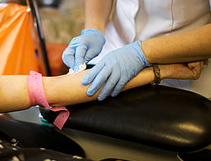
What else should I know about the training?
Examinations:
There is a written examination towards the end of combined infection training, and one further examination (FRCPath ) for trainees doing higher specialty microbiology or virology (with or without Infectious diseases)
Research during training is the norm, though this varies with training region to an extent.
Diplomacy is an essential skill, because of the multiple interactions with other teams.
You need to be prepared to move region to get a training post (so too for consultant posts).
On call
All rotas across region are EWTD compliant.
On call rotas and corresponding pay supplements vary across the training years depending on the training programme (ID-GIM or ID-MM/MV). ID-GIM programmes have on call throughout. ID-MM/MV programmes may have up to 1 year without on call but this is variable. MM/MV rotas are normally an overnight on-call rota for phone advice, with weekend daytimes on-site
All infection trainees may undertake general acute medicine on call. Separate ID on-call is also done at Heartlands hospital (early evening and weekend daytime only), with a commensurate reduction in the GIM on-call frequency. We value some ongoing training in acute general medicine for all ID-micro trainees, particularly in the first year, given that most ID units do not have separate out of hours on-takes for emergencies, and also recognising the need for a good working knowledge of acute admissions units for all infection specialists.
Training Days
There is a rolling programme of monthly training days for the infection specialties (10/yr). In addition there is a similar regional programme (8 days) for GIM, and ID-GIM trainees attend these.